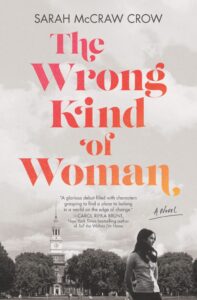THE WRONG KIND OF WOMAN
BOOK REVIEW

Sarah McCraw Crow’s novel transports the reader to the 1970’s at a fictional college similar to Dartmouth. The era is turbulent, both culturally and politically, much like America today. The parallels between now and then are uncanny: a sharply divided nation experiencing a tsunami of discord. Some people push for change. Others resist, fearing that change would bring on the destruction of norms they hold dear, both sides viewing the other as the enemy. Against this backdrop, the author introduces us to three main characters: Virginia, Rebecca and Sam. The book weaves together their stories.
The novel opens with a bang: “Oliver died the Sunday after Thanksgiving, the air heavy with snow that hadn’t fallen yet. His last words to Virginia were, “Tacks, Ginny. Do we have any tacks?”
Oliver’s sudden death catapults his widow, Virginia, into a life she didn’t expect and for which she didn’t prepare. Prior to meeting him, she’d finished all but her dissertation. She doesn’t complete the work for her Ph.D. Instead, after marrying Oliver, a college professor, she devotes her life to supporting his career and raising their daughter, Rebecca. When he dies, she’s forced to look for a job. She soon becomes acutely aware of systemic gender inequality in the workplace.
Rebecca, a thirteen-year-old had enjoyed a warm, companiable relationship with her father. His death shatters her world. Rebecca’s response to this shock is a naïve exploration of drinking and boys. That leads her into dangerous territory and also reveals the “boys will be boys” mindset of the times.
Sam, one of Oliver’s favorite students, is greatly affected by his mentor’s passing. He wonders about his sexuality and constantly analyzes his feelings for Oliver. He winds up involved with an exchange student who is part of a protest movement that employs violence to gain the attention of the people they view as oppressors. Little by little, he’s lured into plan that derails his life.
Via the interwoven stories of these three characters McCraw Crow touches on many topics, including gender inequality in the workplace, violence as a form of protest, white privilege, sexuality, the draft, the war in Viet Nam and women’s healthcare.
Crow’s crisp prose sparkles on the page. The dialogue she writes sounds authentic for the time. Her characters are well drawn and memorable. I read the novel several weeks ago—Virginia, Sam and Rebecca are still bumping around in my mind. As I was reading, I felt invested in them. At different times in the story, as each one contemplated a reckless action, I found myself thinking, “No. Yikes. Back away.”
She does a great job with setting, squarely placing the reader in a privileged, idyllic college town that is experiencing great strife. I thoroughly enjoyed her somewhat disguised mention of my favorite landmarks in Hanover, New Hampshire.
The plot moves along well, touching on many issues, but in a way that feels germane and not superimposed or didactic. Crow captures the zeitgeist of the 1970’s, zeitgeist remarkably like what we are living through now, which makes this book so very relevant and a wonderful book to read, especially right now.
